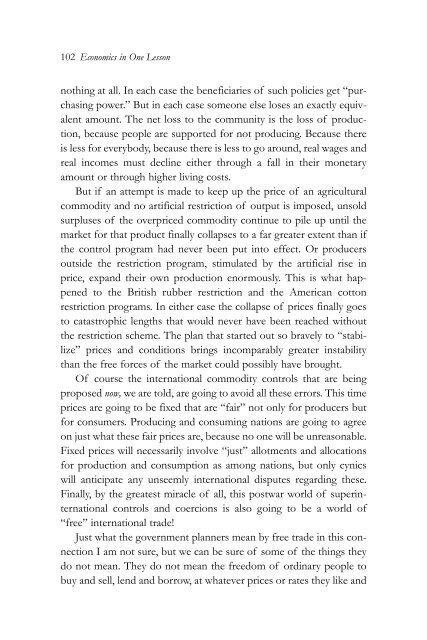1gDdM7w
1gDdM7w
1gDdM7w
- No tags were found...
You also want an ePaper? Increase the reach of your titles
YUMPU automatically turns print PDFs into web optimized ePapers that Google loves.
102 Economics in One Lessonnothing at all. In each case the beneficiaries of such policies get “purchasingpower.” But in each case someone else loses an exactly equivalentamount. The net loss to the community is the loss of production,because people are supported for not producing. Because thereis less for everybody, because there is less to go around, real wages andreal incomes must decline either through a fall in their monetaryamount or through higher living costs.But if an attempt is made to keep up the price of an agriculturalcommodity and no artificial restriction of output is imposed, unsoldsurpluses of the overpriced commodity continue to pile up until themarket for that product finally collapses to a far greater extent than ifthe control program had never been put into effect. Or producersoutside the restriction program, stimulated by the artificial rise inprice, expand their own production enormously. This is what happenedto the British rubber restriction and the American cottonrestriction programs. In either case the collapse of prices finally goesto catastrophic lengths that would never have been reached withoutthe restriction scheme. The plan that started out so bravely to “stabilize”prices and conditions brings incomparably greater instabilitythan the free forces of the market could possibly have brought.Of course the international commodity controls that are beingproposed now, we are told, are going to avoid all these errors. This timeprices are going to be fixed that are “fair” not only for producers butfor consumers. Producing and consuming nations are going to agreeon just what these fair prices are, because no one will be unreasonable.Fixed prices will necessarily involve “just” allotments and allocationsfor production and consumption as among nations, but only cynicswill anticipate any unseemly international disputes regarding these.Finally, by the greatest miracle of all, this postwar world of superinternationalcontrols and coercions is also going to be a world of“free” international trade!Just what the government planners mean by free trade in this connectionI am not sure, but we can be sure of some of the things theydo not mean. They do not mean the freedom of ordinary people tobuy and sell, lend and borrow, at whatever prices or rates they like and


